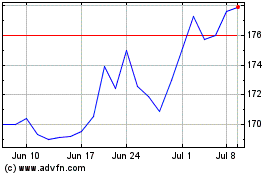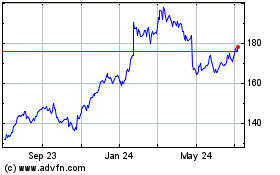Mulling the Economic Effect of Artificial Intelligence
January 18 2017 - 2:36PM
Dow Jones News
By Sam Schechner
DAVOS, Switzerland -- Big leaps in artificial intelligence are
raising tensions among businesses and policy makers over what
impact fast-changing technology will have on millions of
middle-income jobs.
The economic effect of growing automation on jobs is a big
subject of debate this week at the yearly World Economic Forum,
where executives from companies who are pursuing artificial
intelligence, including IBM Corp., Microsoft Corp., Facebook Inc.
and Google parent Alphabet Inc., are gathering, along with
political and economic leaders.
Many executives and economists said they believe that the
development of machines that can learn and act independently will
eventually end up creating more new jobs than they displace, and
raise overall prosperity, as have past waves of industrialization.
But some said this week that they also worry the spoils of the next
revolution could be inequitably shared -- and that the transition
to new models of work could be brutal for many workers.
"I don't think you've even really seen the beginning of the
disruption," said Marc Benioff, chief executive of Salesforce.com
Inc. "The wave of technology will create a big increase in
productivity. But we also risk getting a lot more inequality."
Growing global competition, as well as rising automation, has
been a factor in anemic job growth and stagnant wages in many
Western countries, economists say. A study commissioned by the
organizers of the World Economic Forum published this week
concluded that annual median incomes in 26 advanced economies fell
2.6% in the period between 2008 and 2013
Several prominent tech executives said they expect that
technological disruption will be gradual enough to allow the
workforce to adapt to new jobs working along with intelligent or
automated systems. "It's not man or machine," IBM Chief Executive
Ginni Rometty said Tuesday. "It's a symbiotic relationship. Our
purpose is to augment and be in service of what humans do."
There is some precedent for concern. Increased productivity from
the industrial revolution didn't initially herald an increase in
wages, said Carl Benedikt Frey, an Oxford University economist.
Wage increases came some 80 years later after a new generation of
workers had developed new skills, he added.
David Autor, an economist at the Massachusetts Institute of
Technology, said that many routine jobs in areas like manufacturing
have been lost to automation, while growth has come in lower
skilled manual jobs, as well as high-end work that also requires
more adaptable human intelligence -- polarizing the American
workforce.
In the future, some researchers suggest, driverless cars owned
by companies like Uber Technologies Inc. could displace drivers,
and other types of adaptable software could start to automate some
white-collar jobs involving writing or analysis. The equivalent of
more than 1.1 billion full-time jobs, including more than 100
million in the U.S. and Europe, are associated with automatable
activities, according to a new study from consulting firm
McKinsey.
"The challenge is those mid-skill jobs," Microsoft CEO Satya
Nadella said Wednesday, adding that he believes businesses should
be looking at new social models to avoid social unrest or
burdensome regulation.
"We've got to get somehow to this new formula where both the
return on capital and the return on labor come together," Mr.
Nadella said. "If we don't get it right we are going to have a
vicious cycle."
Write to Sam Schechner at sam.schechner@wsj.com
(END) Dow Jones Newswires
January 18, 2017 14:21 ET (19:21 GMT)
Copyright (c) 2017 Dow Jones & Company, Inc.
International Business M... (NYSE:IBM)
Historical Stock Chart
From Mar 2024 to Apr 2024

International Business M... (NYSE:IBM)
Historical Stock Chart
From Apr 2023 to Apr 2024
